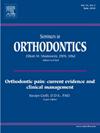Biomechanical considerations for tooth movement and strategies to avoid undesirable side effects
IF 2
4区 医学
Q2 DENTISTRY, ORAL SURGERY & MEDICINE
引用次数: 0
Abstract
Orthodontists prescribe forces to provide tooth movement, and performing it without understanding the fundamentals can put the treatment at risk. To get out of trouble in managing complex cases, orthodontists should understand biomechanics concepts and solutions, as well tooth movement biology. The correct application of the force system impacts the biological tissue responses inducing different responses in a favorable or unfavorable manner. The biomechanical domain prevents round tripping, unnecessary increase in treatment time, and damage to the dentoalveolar tissues. Indubitably, minimizing or preventing unnecessary tooth movement helps to decrease treatment time, which has been associated with root resorption and surrounding tissue damage. In the absence of the correct force system application (forces and moments), orthodontic treatment outcomes become unpredictable. Therefore, the key to success is the correct application of the biomechanics, and clinicians must have biomechanical knowledge and skill in reserve, which will be required when unfortunate surprises strike. If the knowledge is not available, orthodontists limit their success. So, in this article we present some information about the biology of orthodontic tooth movement and rationale biomechanics to prevent orthodontic tooth movement side effects, as well few cases and their biomechanics associated with the treatment.
牙齿移动的生物力学考虑因素和避免不良副作用的策略
正畸医生需要施加一定的力量来实现牙齿移动,如果不了解基本原理,就会给治疗带来风险。为了在处理复杂病例时摆脱困境,正畸医生应了解生物力学概念和解决方案,以及牙齿移动生物学。力系统的正确应用会影响生物组织的反应,从而诱发有利或不利的不同反应。生物力学领域可以防止绕圈、不必要地增加治疗时间以及对牙槽组织造成损害。毫无疑问,尽量减少或防止不必要的牙齿移动有助于缩短治疗时间,而不必要的牙齿移动与牙根吸收和周围组织损伤有关。如果缺乏正确的力系统应用(力和力矩),正畸治疗的结果将变得不可预测。因此,成功的关键在于生物力学的正确应用,临床医生必须储备生物力学知识和技能,以便在不幸的意外发生时能够应对自如。如果不具备这些知识,正畸医生的成功就会受到限制。因此,在本文中,我们将介绍一些有关正畸牙齿移动的生物学知识,以及预防正畸牙齿移动副作用的合理生物力学,以及与治疗相关的一些病例及其生物力学。
本文章由计算机程序翻译,如有差异,请以英文原文为准。
求助全文
约1分钟内获得全文
求助全文
来源期刊

Seminars in Orthodontics
DENTISTRY, ORAL SURGERY & MEDICINE-
CiteScore
2.20
自引率
4.80%
发文量
28
审稿时长
10 days
期刊介绍:
Each issue provides up-to-date, state-of-the-art information on a single topic in orthodontics. Readers are kept abreast of the latest innovations, research findings, clinical applications and clinical methods. Collection of the issues will provide invaluable reference material for present and future review.
 求助内容:
求助内容: 应助结果提醒方式:
应助结果提醒方式:


